19 start with Q start with Q

Contributors examine the relationships among reader, creator, and community across a range of comics production, including mainstream superhero comics, independent LGBTQ comics, and avant-garde and experimental feminist narratives. They also address queer forms of identification elicited by the classic X-Men character Rogue, the lesbian grassroots publishing networks that helped shape Alison Bechdel’s oeuvre, and the production of black queer fantasy in the Black Panther comic book series, among other topics.
Contributors andré carrington, Anthony Michael D’Agostino, Ramzi Fawaz, Margaret Galvan, Yetta Howard, Joshua Abraham Kopin, Kate McCullough, Darieck Scott, Jessica Q. Stark, Shelley Streeby, Rebecca Wanzo
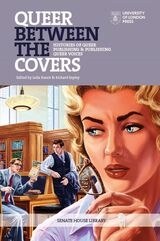
Queer Between the Covers presents a history of radical queer publishing and literature from 1880 to the modern day. Chronicling the gay struggle for acceptance and liberation, the book demonstrates how the fight for representation was often waged between the covers of books in a world where spaces for queer expression were taboo. The chapters provide an array of voices and histories from the famous, Derek Jarman and Oscar Wilde, to the lesser known and underappreciated, such as John Wieners and Valerie Taylor. It includes firsthand accounts of seminal moments in queer history, including the birth of Hazard Press and the Defend Gay’s the Word Bookshop campaign in the 1980s.
Queer Between the Covers demonstrates the importance of the book and how the queer community could be brought together through shared literature. The works discussed show the imaginative and radical ways in which queer texts have fought against censorship and repression and could be used as a political tool for organization and production. This study follows key moments in queer literary history, from the powerful community wide demonstrations for Gay’s the Word during their battle with the British government, to the mapping of Chicago’s queer spaces within Valerie Taylor’s pulp novels, or the anonymous but likely shared authorship of the nineteenth century queer text Teleny. Queer publishing also often involved fascinating creative tactics for beating the censor, from the act of self-publishing to anonymous authorship as part of a so-called “cloaked resistance.” Collage and repurposing found images and texts were key practices for many queer publishers and authors, from Derek Jarman to the artworks created by the Hazard Press.
This is a fascinating and topical book on publishing history for those interested in how queer people throughout modernity have used literature as an important forum for self-expression and self-actualization when spaces and sites for queer expression were outlawed.

These comics are created by queer artists for queer audiences and with the intent for queer self-expression and representation. Social science researchers spoke to diverse members of LGBTQ+ communities to explore their beliefs about and experiences of compassion. Fifteen queer comics were commissioned to illustrate those stories, making the process of creating each comic a unique collaboration between researchers and artists, blending data exploring the meanings of compassion for queer folks with the creativity, passion, and understanding of a queer comic artist.
These stories reflect not only the harsh realities that many queer people face but they also uplift queer voices, illustrate strength, and capture queer resolve to make life more compassionate. Queer people, living in a cis-heteronormative world, often face experiences of marginalization, discrimination, stigma, trauma, and invisibility in everyday life. Queer Compassion shows that its titular emotion can be the bridge that brings understanding and creates community connections — a bridge that is particularly needed at this time.
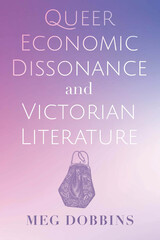
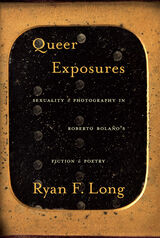
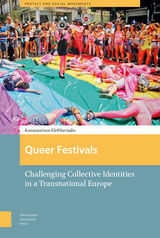
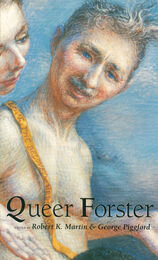
Many previous critics of Forster downplayed his homosexuality or read Forster naively in terms of gay liberation. This collection situates Forster within the Bloomsbury Group and examines his relations to major figures such as Henry James, Edward Carpenter, and Virginia Woolf. Particular attention is paid to Forster's several accounts of India and their troubled relation to the British colonial enterprise. Analyzing a wide range of Forster's work, the authors examine material from Forster's undergraduate writings to stories written more than a half-century later.
A landmark book for the study of gender in literature, Queer Forster brings the terms "queer" and "gay" into conversation, opening up a dialogue on wider dimensions of theory and allowing a major revaluation of modernist inventions of sexual identity.

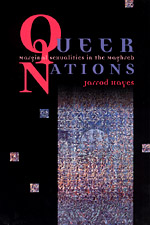
In this incisive postcolonial study, Jarrod Hayes uses literary analysis to examine how Francophone novelists from the Maghreb engaged in a diametric nation-building project. Their works imagined a diverse nation peopled by those who were excluded by the dominant political discourses, especially those who did not conform to traditional sexual norms. By incorporating representations of marginal sexualities, sexual dissidence, and gender insubordination, Maghrebian novelists imagined an anticolonial struggle that would result in sexual liberation and envisioned nations that could be defined and developed inclusively.
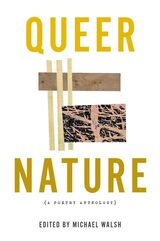
This anthology amplifies and centers LGBTQIA+ voices and perspectives in a collection of contemporary nature poetry. Showcasing over two hundred queer writers from the nineteenth to the twenty-first century, Queer Nature offers a new context for and expands upon the canon of nature poetry while also offering new lenses through which to view queerness and the natural world.
In the introduction, editor Michael Walsh writes that the anthology is “concerned with poems that speak to and about nature as the term is applied in everyday language to queer and trans bodies and identities . . . Queer Nature remains interested in elements, flora, fauna, habitats, homes, and natural forces—literary aspects of the work that allow queer and trans people to speak within their specific cultural and literary histories of the abnormal, the animal, the elemental, and the unnatural.” The anthology features poets including Elizabeth Bishop, Richard Blanco, Kay Ryan, Jericho Brown, Allen Ginsberg, Natalie Diaz, and June Jordan, as well as emerging voices such as Jari Bradley, Alicia Mountain, Eric Tran, and Jim Whiteside.
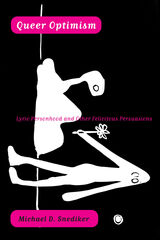
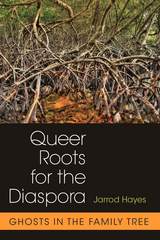
The central argument of Queer Roots for the Diaspora is that, in spite of these debates, ultimately the desire for roots contains the “roots” of its own deconstruction. The book considers alternative root narratives that acknowledge the impossibility of returning to origins with any certainty; welcome sexual diversity; acknowledge their own fictionality; reveal that even a single collective identity can be rooted in multiple ways; and create family trees haunted by the queer others patrilineal genealogy seems to marginalize.
The roots narratives explored in this book simultaneously assert and question rooted identities within a number of diasporas—African, Jewish, and Armenian. By looking at these together, one can discern between the local specificities of any single diaspora and the commonalities inherent in diaspora as a global phenomenon. This comparatist, interdisciplinary study will interest scholars in a diversity of fields, including diaspora studies, postcolonial studies, LGBTQ studies, French and Francophone studies, American studies, comparative literature, and literary theory.

The central argument of Queer Roots for the Diaspora is that, in spite of these debates, ultimately the desire for roots contains the “roots” of its own deconstruction. The book considers alternative root narratives that acknowledge the impossibility of returning to origins with any certainty; welcome sexual diversity; acknowledge their own fictionality; reveal that even a single collective identity can be rooted in multiple ways; and create family trees haunted by the queer others patrilineal genealogy seems to marginalize.
The roots narratives explored in this book simultaneously assert and question rooted identities within a number of diasporas—African, Jewish, and Armenian. By looking at these together, one can discern between the local specificities of any single diaspora and the commonalities inherent in diaspora as a global phenomenon. This comparatist, interdisciplinary study will interest scholars in a diversity of fields, including diaspora studies, postcolonial studies, LGBTQ studies, French and Francophone studies, American studies, comparative literature, and literary theory.
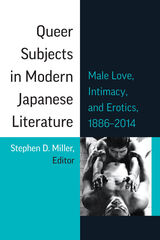
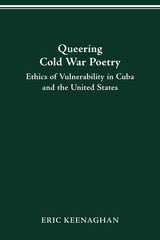
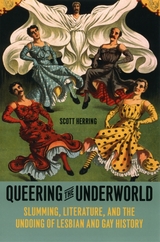
In this major rethinking of American literature and culture, Scott Herring explores how a key group of authors manipulated this genre to paradoxically evade the confines of sexual identification. Queering the Underworld examines a range of writers, from Jane Addams and Willa Cather to Carl Van Vechten and Djuna Barnes, revealing how they fulfilled the conventions of slumming literature but undermined its goals, and in the process, queered the genre itself. Their work frustrated the reader’s desire for sexual knowledge, restored the inscrutability of sexual identity, and cast doubt on the value of a homosexual subculture made visible and therefore subject to official control.
Herring is persuasive and polemical in connecting these writers to ongoing debates about lesbian and gay history and politics, and Queering the Underworld will be widely read by students and scholars of literature, history, and sexuality.
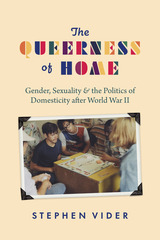
From the Stonewall riots to the protests of ACT UP, histories of queer and trans politics have almost exclusively centered on public activism. In The Queerness of Home, Stephen Vider turns the focus inward, showing that the intimacy of domestic space has been equally crucial to the history of postwar LGBTQ life.
Beginning in the 1940s, LGBTQ activists looked increasingly to the home as a site of connection, care, and cultural inclusion. They struggled against the conventions of marriage, challenged the gendered codes of everyday labor, reimagined domestic architecture, and contested the racial and class boundaries of kinship and belonging. Retelling LGBTQ history from the inside out, Vider reveals the surprising ways that the home became, and remains, a charged space in battles for social and economic justice, making it clear that LGBTQ people not only realized new forms of community and culture for themselves—they remade the possibilities of home life for everyone.
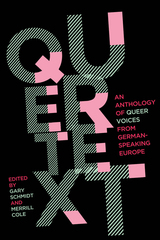
These outstanding texts exemplify the glittering variety of styles, themes, settings, and subjects addressed by openly queer authors who write in German today. They explore identity, sexuality, history, fantasy, loss, and discovery. Their authors, narrators, and characters explore gender nonconformity and living queer everywhere from city centers to rural communities. They are gay, lesbian, bisexual, trans, and nonbinary. They are exiles, immigrants, and travelers through time and space.
Witty, titillating, and a delight to read, Quertext opens up new worlds of experience for readers interested in queer life beyond the Anglophone world.
Featuring work by Jürgen Bauer • Ella Blix • Claudia Breitsprecher • Lovis Cassaris • Gunther Geltinger • Joachim Helfer • Odile Kennel • Friedrich Kröhnke • Anja Kümmel • Marko Martin • Hans Pleschinski • Christoph Poschenrieder • Peter Rehberg • Michael Roes • Sasha Marianna Salzmann • Angela Steidele • Antje Rávik Strubel • Alain Claude Sulzer • Antje Wagner • J. Walther • Tania Witte • Yusuf Yeşilöz
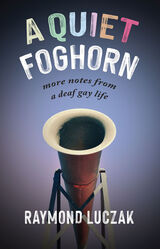
READERS
Browse our collection.
PUBLISHERS
See BiblioVault's publisher services.
STUDENT SERVICES
Files for college accessibility offices.
UChicago Accessibility Resources
home | accessibility | search | about | contact us
BiblioVault ® 2001 - 2024
The University of Chicago Press









